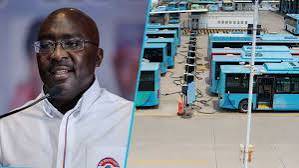Electric Buses Promised by Vice President Bawumia Arrive in Ghana: A Step Towards Sustainable Transport
In a major milestone for Ghana's transport sector, the electric buses promised by Vice President Dr. Mahamudu Bawumia have officially arrived in the country. This move marks a significant step in the government's commitment to sustainable and environmentally-friendly public transport solutions. With climate change concerns intensifying globally, Ghana’s introduction of electric buses is expected to help reduce the country's carbon footprint while improving urban mobility.
The arrival of the electric buses comes after several promises made by Dr. Bawumia during his public engagements. In 2021, during the unveiling of the “Vision for a Sustainable and Green Economy,†Bawumia outlined plans to integrate electric vehicles into Ghana’s transport system. He emphasized the need to transition from traditional fossil-fueled vehicles to electric-powered options as part of the country’s broader agenda to promote clean energy and reduce pollution.
The buses, which are part of an ambitious initiative to modernize the public transport system, have been welcomed by both environmentalists and urban planners. The shift to electric vehicles is seen as a way to address the growing concerns around air pollution in Ghana’s major cities, particularly Accra. As the capital city struggles with smog and high levels of carbon emissions due to a high number of fuel-powered vehicles, electric buses offer a cleaner and more sustainable alternative.
The new electric buses, which were introduced in collaboration with international partners and local stakeholders, are designed to provide a reliable, affordable, and eco-friendly mode of transportation. They are equipped with state-of-the-art features, including zero emissions, quiet operation, and lower operational costs compared to conventional buses. The buses are powered by rechargeable batteries that can be easily charged at designated stations, reducing the need for fossil fuels and cutting down on greenhouse gas emissions.
In addition to their environmental benefits, the electric buses are expected to offer a more comfortable and efficient service to passengers. The buses are designed with modern amenities such as air conditioning, comfortable seating, and spacious interiors, making them an attractive option for commuters. Their introduction also aligns with the government's efforts to improve public transport infrastructure and enhance the quality of life for urban dwellers.
The arrival of the electric buses is part of Ghana's broader strategy to diversify its energy sources and reduce its dependence on traditional forms of energy. By promoting electric vehicles, the government is not only addressing environmental issues but also supporting the country’s long-term energy goals. In the coming years, Ghana plans to expand its network of electric vehicles across various sectors, including taxis, ride-hailing services, and even cargo transport.
However, while the introduction of electric buses is a significant achievement, challenges remain. One of the major obstacles is the high upfront cost of electric vehicles, which can make it difficult for some local operators to switch from traditional buses. Additionally, the infrastructure needed for widespread adoption, such as charging stations and maintenance facilities, will require substantial investment and planning. The government, however, has indicated that it will work with private investors and development partners to overcome these challenges.
In conclusion, the arrival of electric buses in Ghana is a significant step towards a greener, more sustainable future. As the country looks to address climate change and enhance its public transport system, these buses represent a promising start. If successfully implemented and expanded, electric buses could transform Ghana’s transport landscape, making cities cleaner, quieter, and more efficient, while also setting an example for other African nations to follow.



No comments yet
Be the first to share your thoughts!